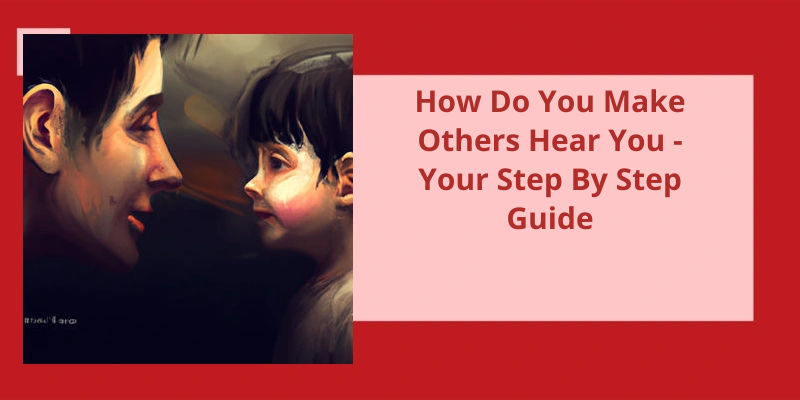In a world filled with noise and distractions, it can often seem impossible to effectively communicate and make others truly hear you. Whether it's a personal conversation, a professional presentation, or a public speech, the ability to captivate and engage your audience is a skill that can make all the difference. But how do you ensure that your voice is heard above the clamor? How do you make your message resonate with others in a way that grabs their attention and leaves a lasting impact? This step-by-step guide is designed to provide you with the tools and techniques necessary to become a master communicator. From the art of storytelling to the power of body language, we will explore the various strategies that can help you command attention, convey your thoughts effectively, and ultimately make others not just listen, but truly hear you. So, if you're ready to unlock the secrets of impactful communication and start making a genuine connection with your audience, join us on this transformative journey.
How Do You Make Others Hear You?
When it comes to making others truly hear you, listening is key. Take the time to truly listen to others and show genuine interest in what they’ve to say. This not only helps you understand their perspective, but it also builds a foundation of trust and respect. By actively engaging in conversation and asking thoughtful questions, you signal to others that you value their input and opinions.
While it’s natural to want to talk about yourself, focusing too much on your own experiences and achievements can come off as self-centered. Instead, shift the focus towards the other person. Encourage them to share their thoughts and experiences, and make sure to actively listen and respond. This not only helps them feel heard, but it also creates a more balanced and dynamic conversation.
Nonverbal communication can often speak louder than words. Pay attention to your body language, facial expressions, and tone of voice when communicating with others. Make sure your nonverbal cues align with your words and convey your message effectively. Additionally, be mindful of the other persons nonverbal cues. Pay attention to their body language, gestures, and facial expressions, as these can provide valuable insights into their thoughts and feelings.
Putting the important stuff in writing can be a powerful way to make others hear you. Whether it’s an email, a memo, or a presentation, written communication allows you to clearly articulate your thoughts and ideas. Take the time to organize your message, use concise language, and provide clear supporting points. This not only helps ensure that your message is understood, but it also allows others to refer back to your written communication for clarity and reference.
Finally, building relationships is essential in making others hear you. Take the time to establish genuine connections with others, both professionally and personally. By showing respect, empathy, and understanding, you foster a sense of trust and rapport. This lays the foundation for effective communication, as people are more likely to listen and engage when they feel connected to you on a deeper level. Invest in building relationships, and youll find that others are more willing to hear and support you.
Overcoming Communication Barriers: Explore Common Barriers to Effective Communication, Such as Language Barriers, Cultural Differences, and Emotional Barriers. Provide Tips on How to Overcome These Barriers to Make Others Hear You.
In this article, we will explore the common barriers to effective communication and provide you with tips on how to overcome them. These barriers include language barriers, cultural differences, and emotional barriers.
Language barriers can hinder effective communication, especially when people don’t share a common language. To overcome this, you can use simple and concise language, avoid jargon, and use visual aids or non-verbal communication to enhance understanding.
Cultural differences can also create communication barriers. To overcome this, it’s important to be mindful of different cultural norms and customs. Show respect and sensitivity towards others’ cultural backgrounds, listen actively, and ask clarifying questions when needed.
Emotional barriers, such as fear, anxiety, or stress, can impact communication. To overcome these barriers, it’s crucial to create a safe and supportive environment. Practice active listening, validate others’ emotions, and respond empathetically.
By understanding and addressing these common communication barriers, you can enhance your ability to make others hear you and improve the overall effectiveness of your communication.
When it comes to making sure you’re being heard, there are a few strategies you can employ. One of the most important things you can do is speak up and speak with confidence. This sends a clear signal to others that you’ve something important to say and deserve to be heard. However, it’s not just about getting your own message across; being an engaged and supportive listener is equally crucial. By actively listening to others and showing genuine interest in what they’ve to say, you establish a rapport and create an environment where everyone’s voices are valued. So, let’s explore some practical tips on how to effectively communicate your thoughts and ensure that your message resonates with others.
How Do You Make Sure You Are Being Heard?
If you want to make sure that you’re being heard, one of the most important things you can do is to speak up and speak with confidence. This means not only expressing your thoughts and opinions, but also making sure that your voice is heard and understood. It may be intimidating at times, but standing up for yourself and confidently voicing your ideas can make a big difference in how others perceive and respond to you.
Another important aspect of being heard is being an engaged and supportive listener. Listening well when others speak isn’t just about being polite, but it also shows others that you genuinely care about them and are fully present in the conversation. Instead of simply waiting for your turn to talk, actively listen to what others are saying, ask questions, and show empathy. This not only helps to create a supportive environment, but also encourages others to reciprocate and truly listen to what you’ve to say.
In addition to speaking up and being a supportive listener, another way to ensure that you’re being heard is to find the right timing and approach. Sometimes, the way in which you present your ideas can greatly impact how they’re received. Choose the appropriate time and place to communicate your message, consider the audience and their potential receptiveness, and tailor your delivery accordingly. Using clear and concise language, maintaining a calm and confident tone, and providing supporting evidence or examples can also enhance your chances of being heard effectively.
Furthermore, it’s crucial to be mindful of your body language and nonverbal cues when trying to make others hear you. The way you carry yourself and the nonverbal signals you send can convey a lot about your confidence, authenticity, and sincerity. Maintain good eye contact, use open and inviting gestures, and make sure that your body language matches your verbal communication.
Lastly, building strong relationships and rapport with others plays a crucial role in making sure that you’re heard. When you’ve a foundation of trust and respect with someone, they’re more likely to listen to what you’ve to say and take your opinions into consideration. Building these relationships takes time and effort, but can be achieved by being consistent, authentic, and supportive in your interactions. By establishing a sense of mutual trust and understanding, you can create an environment where your voice is valued and given the attention it deserves.
Using Technology to Enhance Communication and Ensure You Are Heard.
In today’s digital age, there are various ways to use technology effectively to enhance communication and make sure your voice is heard. One way is through the use of video conferencing tools, which allow for face-to-face communication even when you’re physically apart. These tools help convey non-verbal cues and enable better understanding between participants.
Another way to enhance communication is by utilizing social media platforms and online communities. These platforms provide a space to share your thoughts, ideas, and opinions with a wider audience. Engaging with others online can help you build a network and increase your visibility, ensuring that your voice reaches a larger audience.
Additionally, technology offers various communication tools such as email, instant messaging, and collaborative platforms. These tools enable efficient and timely communication, making it easier for others to hear you and respond promptly.
Overall, incorporating technology into your communication strategy can significantly enhance your ability to make others hear you. By using video conferencing, social media, and other communication tools, you can ensure that your voice is amplified and your message reaches the right audience.
Source: How To Get People To Listen To You (12 Ways To Be Heard)
Active listening is an essential skill in effective communication, but it goes beyond just hearing the words someone is saying. It’s about making the speaker feel valued and understood. To achieve this, it’s important to face the speaker, make eye contact, and pay attention to non-verbal cues. Interrupting, judging, and jumping to conclusions should be avoided, as should the tendency to start planning what to say next. Instead, stay focused, ask questions, and refrain from imposing your own opinions or solutions. By practicing these ten tips for active listening, you can truly make someone feel heard and validated.
How Do You Make Someone Know You Are Listening to Them?
One of the most effective ways to make someone know that you’re truly listening to them is by facing the speaker and maintaining eye contact. This simple yet powerful gesture conveys that you’re fully present and engaged in the conversation. It shows that you value and respect the speaker and their words.
In addition to paying attention to verbal cues, it’s equally important to “listen” to non-verbal cues. Body language, facial expressions, and tone of voice can provide valuable insights into the speakers emotions, thoughts, and intentions. By observing and understanding these non-verbal cues, you can gain a deeper understanding of what the speaker is trying to communicate.
Interrupting is a common habit that many of us have, but it can be incredibly disruptive to effective communication. When you interrupt someone, you not only interrupt the flow of their thoughts and ideas, but you also send the message that what they’ve to say isn’t important. To make someone know that you’re listening, it’s crucial to refrain from interrupting and allow them to express themselves fully.
Active listening requires withholding judgment and avoiding jumping to conclusions. Instead of prematurely forming opinions or making assumptions, strive to understand the speakers perspective and experiences. By suspending judgment, you create a safe space for open and honest communication, which encourages the speaker to express themselves more freely.
To truly hear someone, it’s essential to resist the urge to start planning what to say next. When your mind is busy formulating responses, you aren’t fully present in the conversation. Instead, focus on the speakers words and allow them to fully express their thoughts and feelings without interruption.
Staying focused is another key aspect of active listening. With the distractions of our modern lives, it can be challenging to give our full attention to the speaker. However, by consciously making an effort to stay present and attentive, you signal to the speaker that their words and thoughts are valuable to you.
Finally, asking questions is an excellent way to show that you’re actively listening. By asking thoughtful and relevant questions, you demonstrate your genuine interest in understanding the speakers perspective. Questions can help clarify any uncertainties and provide an opportunity for deeper exploration and connection.
The Importance of Empathy in Active Listening: Discuss How Empathy Plays a Crucial Role in Truly Understanding and Connecting With the Speaker.
The importance of empathy in active listening can’t be overstated. Empathy allows us to put ourselves in the speaker’s shoes, to understand their thoughts and feelings, and to truly connect with them on a deeper level. When we listen with empathy, we not only hear the words being spoken, but also the emotions and underlying meaning behind those words.
Empathy helps to build trust, as it shows the speaker that we genuinely care about their perspective and experiences. It allows us to suspend judgment and to create a safe space for open and honest communication. By empathizing with the speaker, we’re better able to respond in a supportive and understanding manner, which can lead to more meaningful conversations and stronger relationships.
Furthermore, empathy aids in our understanding of others’ perspectives and broadens our own worldview. It allows us to step outside of our own biases and preconceived notions, and to truly listen to and learn from different experiences and viewpoints. Through empathy, we can foster greater understanding and appreciation for diverse individuals and cultures, promoting a more inclusive and respectful society.
In summary, empathy is a crucial component of active listening. By approaching conversations with empathy, we can foster deeper connections, build trust, and gain a better understanding of others. Through empathetic listening, we give others the space to be heard and valued, creating a more compassionate and inclusive world.
The first step in practical listening is intention, which involves consciously deciding to listen and seeking to understand the speaker’s message. Attention is the second step, where one focuses on the speaker and eliminates distractions to fully engage in the conversation. Lastly, retention refers to the ability to retain and remember the information received. By following these three fundamental steps, we can enhance our listening skills and foster effective communication.
What Are the 3 Basic Steps in Listening?
Listening is an essential skill that allows individuals to effectively communicate and connect with others. The process of listening can be broken down into three basic steps: intention, attention, and retention. Each of these steps plays a crucial role in successful listening.
The first step in the process is intention. This involves consciously deciding to listen and have an open mind. It’s important to approach any conversation or interaction with the intention of understanding and valuing the speakers perspective. This mindset sets the foundation for effective listening and helps build trust and rapport with the speaker.
Once the intention is set, the next step is attention. This involves giving the speaker your full focus and concentration. Active listening techniques, such as maintaining eye contact, nodding, and providing verbal feedback, can help demonstrate your attention and engagement. By fully immersing yourself in the conversation, you create an environment of respect and validation for the speaker.
The final step in the listening process is retention. This step involves retaining and remembering the information shared by the speaker. To enhance retention, it’s crucial to employ memory aids such as note-taking or mentally summarizing the key points. Additionally, reflecting on the information and discussing it with others can deepen understanding and aid in long-term retention.
By following these three steps, intention, attention, and retention, you can become a more effective listener and ensure that others hear you. Practicing these steps consistently won’t only improve your communication skills but also strengthen your relationships and connections with others.
The Importance of Empathy in Listening
The importance of empathy in listening can’t be overstated. When we truly listen to others with empathy, we strive to understand their thoughts, feelings, and perspectives without judgment. Empathy allows us to connect on a deeper level, validating the other person’s experiences and making them feel heard and understood.
By practicing empathy in our conversations, we create a safe and supportive environment where people feel comfortable sharing their thoughts and emotions. This fosters effective communication, builds stronger relationships, and enhances mutual trust and respect.
Empathy involves active listening, being present in the moment, and showing genuine interest in what the other person is saying. It requires setting aside our own preconceptions and biases, and focusing on the speaker’s words and non-verbal cues. By putting ourselves in their shoes, we gain a deeper understanding of their perspective and can respond in a more empathetic and meaningful way.
In summary, empathy is a crucial component of effective listening. It enables us to create meaningful connections, build trust, and foster stronger relationships. By practicing empathy, we can make others feel heard and valued, leading to more productive and fulfilling interactions.
In order to effectively communicate and convey our thoughts, opinions, or presence, it’s necessary to make ourselves heard, understood, or known. Whether it’s speaking louder to overcome a noisy environment or utilizing different methods to make sure our message is received, the act of making ourselves heard requires determination and assertiveness.
What Does Make Yourself Heard Mean?
Making yourself heard means successfully getting someone to pay attention to you, understand your message, and acknowledge your presence. It involves effectively communicating your thoughts, ideas, and opinions, making them known and understood by others. Sometimes, in order to make yourself heard, you might need to raise your voice, figuratively or literally, to overcome external obstacles or competing distractions.
To make yourself heard, it’s important to utilize effective communication skills. This includes using clear and concise language, articulating your words properly, and expressing your thoughts with confidence and conviction. Nonverbal cues, such as body language and facial expressions, can also play a crucial role in conveying your message.
Active listening is another essential aspect of making yourself heard. By attentively listening to others, you demonstrate respect and empathy, and create a reciprocal environment where your own voice is more likely to be heard. Acknowledging and respecting diverse perspectives can foster open dialogue and make it easier for others to hear and understand your own viewpoint.
In addition, choosing the right timing and context can significantly impact how your message is received. Being mindful of the environment, both physical and emotional, can help you tailor your message to fit the situation. For example, if you’re in a noisy environment, you might need to adjust your communication style or find ways to ensure your voice is clearly heard.
Moreover, building credibility and establishing trust are crucial to making yourself heard. When others perceive you as knowledgeable, reliable, and trustworthy, they’re more likely to listen to what you’ve to say. This can be achieved through consistent and honest communication, providing evidence and supporting arguments, and actively participating in relevant discussions.
It’s an ongoing process of effective communication, active listening, adapting to different situations, and building credibility. By following these steps, you can increase your chances of making yourself heard and making a meaningful impact on others.
The Importance of Assertiveness in Making Yourself Heard
Assertiveness is a crucial skill when it comes to making yourself heard. It involves expressing your thoughts, opinions, and needs in a direct and confident manner, while respecting the rights and boundaries of others. By being assertive, you ensure that your voice is heard and your ideas are taken into consideration. When you assert yourself effectively, you can build stronger relationships, gain respect, and have a greater influence on the people around you. Assertiveness empowers you to communicate more effectively, stand up for yourself, and make a positive impact in your personal and professional life.
As human beings, our need for connection and belonging is intrinsic to our well-being. When we make ourselves heard, we’re affirming our presence and asserting our worth in the world. It’s an act of empowerment, allowing us to express our thoughts, emotions, and needs effectively. Being heard fosters understanding, builds relationships, and paves the way for personal growth and positive change. In this article, we will delve into the significance of making oneself heard and explore practical strategies to ensure our voices aren’t just heard, but genuinely listened to.
Why Is It Important to Make Yourself Heard?
When we make ourselves heard, we’re able to fully express our thoughts, ideas, and emotions to others. This allows us to build deeper connections and form meaningful relationships. When we feel heard, it boosts our self-esteem and enhances our confidence in our abilities and opinions. It’s an empowering experience that validates our presence and contribution in any given situation.
Moreover, when we make ourselves heard, we can influence and inspire others. Our ideas and perspectives can shape the opinions and actions of those around us. By expressing our thoughts and beliefs, we’ve the power to make a positive impact on individuals and communities. Whether it’s advocating for an important cause, sharing knowledge and expertise, or simply offering support and encouragement, making ourselves heard has the potential to create change and make a difference.
Additionally, making ourselves heard cultivates trust and respect in personal and professional relationships. When we’re able to effectively communicate our needs and desires, others are more likely to listen and respond to them. This builds trust and strengthens relationships, leading to better collaboration and cooperation. Being heard also allows us to navigate disagreements and conflicts constructively, finding resolutions and maintaining healthy relationships.
Conclusion
In conclusion, successfully making others hear you is a multifaceted process that requires careful consideration of the steps outlined in this guide. By developing strong communication skills, actively listening to others, expressing yourself assertively, and creating a supportive environment, you can increase your chances of being heard and understood. Remember, effective communication is a two-way street, and you must be willing to adapt and adjust your approach to enhance understanding and foster meaningful connections with others. So, express yourself confidently, engage others with empathy, and make your voice heard in a way that resonates and inspires those around you.





